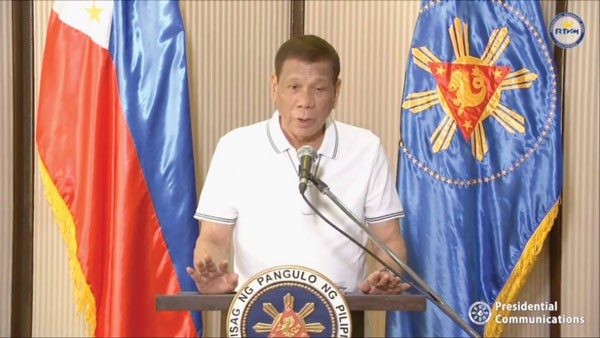
Philippine President Rodrigo Duterte came under fire after ordering the police and military to shoot quarantine violators dead during Luzon’s enhanced community quarantine due to the novel coronavirus (COVID-19).
“I will not hesitate. My orders are to the police and military, also the barangay, that if there is trouble or the situation arises that people fight and your lives are on the line, shoot them dead,” he said Wednesday, April 1, during an impromptu televised address.
This came after 21 Quezon City residents were arrested by the police for demanding help and protesting without a permit.
“Do not intimidate government. Do not challenge government. Matatalo kayo, sigurado (You’ll surely lose),” Duterte said.
His statements have since been condemned by human rights groups who urged everyone not to view Duterte’s threats as empty.
“At the very least, Duterte gives the police all the justification they need to commit human rights abuses against people who may be violating these COVID-19 regulations because they needed to find work or food,” noted Human Rights Watch.
Karapatan said: “We are seriously alarmed that the President’s words will translate to worse and more brutal forms of human rights violations, repression, and state violence in the days to come.”
“Indeed, there is a much deadlier virus than COVID-19. It is being wielded by no less than the President, who is responsible for the thousands of lives lost borne out of his murderous, brazen and anti-poor policies,” the group added.
Amnesty International (AI) called out the government’s “oppressive approach” to those struggling with basic needs.
“Deadly, unchecked force should never be referred to as a method to respond to an emergency such as the COVID 19 pandemic,” the group said, urging Duterte to cease the “dangerous incitement to violence.”
“The lives of those most at risk must be considered a priority, in the effort to minimize the threat of the virus,” AI stressed.
Netizens and celebrities alike also expressed their outrage over the president’s threats on various social media platforms.
“What our people need now is empathy not threats,” tweeted ABS-CBN actress Liza Soberano.
“Virus pa rin ba ang kalaban dito? Nasaan na ang konkretong plano? (Is virus still the enemy here? Where are the concrete plans?)” said TV host Gretchen Ho in a tweet.
GMA actress Lauren Young, meanwhile, posted: “Takot na nga yung mga tao (The people are already scared) because of this virus. Their own government is depriving them of food, their officials are MIA, one was parading about without following guidelines and you have the nerve to scare them even more with violence? WHY? How is that helpful?”
Actress Agot Isidro also tweeted: “People are hungry. People are sick. People are dying. And you talk about shooting them dead??? It’s a fracking HEALTH CRISIS!”
“Duterte is not incompetent. He is culpable. When he endorses the killings of urban poor communities, it is not an act of mediocrity but an act of evil,” one netizen posted.
“Bigas, hindi bala. Batas, hindi dahas. Tulong, hindi kulong. Mass test, hindi mass arrest,” another one said.
Palace: Duterte’s threats legal
Presidential Spokesperson Salvador Panelo, for his part, said Duterte is allowed to make violent threats against leftist groups looking to stir public sentiment against the government.
“Threatening violators and enemies of the state with deathly violence is not a crime. The law allows the use of lethal violence when the person’s life using it hangs on balance,” he noted Friday.
“The president is tasked by the Constitution to enforce it and the laws of the land. Transgressors will suffer the consequences of their violations as imposed by law,” he added.




